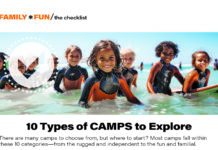When you have a child with life-threatening food allergies, summer camp becomes more complicated than filling out forms and dropping your child off each morning. With planning, cooperation and communication, day camp can be a great and safe experience for food-allergic children.
Many camps willingly accommodate food allergies. Since each child’s medical condition is different, check with your allergist for concerns first. Once you have chosen a potential camp, research its policies on food allergies. If no written policy exists, talk with the director.
Ask the following questions, substituting your child’s specific allergy for the peanut example.
Do campers bring a lunch from home? If so, will your child have a safe place to eat, such as a nut-free table?
Is there a policy for other campers to wash their hands and faces after eating foods that contain peanuts?
If the camp prepares meals or snacks, do any of the foods contain peanuts? If not, is there any possibility of cross-contamination with peanuts either in the kitchen or before the food arrives? Can you send in allergy-safe food?
Will campers do any craft projects that use peanuts? If so, can a substitution be made? Even if a project should not be eaten, allergenic materials can get into a child’s eyes, nose or mouth and cause an allergic reaction.
Who handles medical care at the camp? Is there a nurse or first-aid person onsite? If so, is he trained to use an epinephrine auto-injector? Who substitutes for the medical staff person if he is away?
Meet with the camp’s medical staff and describe your child’s typical signs and symptoms of an allergic reaction. If the staff person has never used an epinephrine auto-injector, teach him how. Provide a clear, written allergy action plan with a picture of your child attached. Make your own or download a template from foodallergy.org/files/FAAP.pdf
Even if the camp has medical staff on site, train the counselor who will spend the day with your child how to recognize an allergic reaction. She will be the person to get your child help in an emergency. Every adult who will interact with your child should know about the allergy and what to do if a reaction occurs. Go into the building each morning to see if the staff has changed. Inform any new person of your child’s needs.
Who will carry your child’s medicine? Make sure that person knows the correct temperature to store epinephrine. Refer to the instructions in your own epinephrine auto-injector, or talk to your pharmacist for storage requirements.
How far away is the nearest hospital or clinic? What is the response time?
Will there be offsite field trips? If so, are the driver and leader trained to handle your child’s allergy? Will they have cell phones or two-way radios to communicate in an emergency?
These questions will get you started with your allergy action plan for day camp. Always discuss your child’s individual needs with his medical provider to decide if it is safe for him to go to camp. Once your child has been cleared for camp, prepare everyone so he can have a safe, happy camping experience.
Tiffany Doerr Guerzon is a freelance writer and the mother of three children, including one who has peanut and tree nut allergies. Read more of her writing at TDGuerzon.com.






